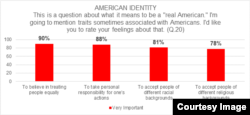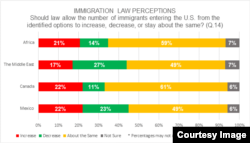Almost one-quarter of Americans believe native-born Christians are the "real Americans" but an overwhelming number of U.S. adults say that treating people equally and taking personal responsibility for one’s actions are the true tests of "Americaness."
“People really feel like ideals are core to being American more than any identity or background," says Caleb Elfenbein, associate professor of history and religious studies at Grinnell College, which commissioned a national poll on the subject. "Ninety percent of respondents indicated that they believe treating people equally is essential to being American.”
The Grinnell College National Poll, conducted last month, surveyed 1,000 U.S. adults over the age of 18.
Twenty-four percent of the people polled say “real Americans" are born in the United States, 23 percent identify authentic Yankees as those who have lived in the United States most of their lives, and 23 percent say you have to be Christian to be a "real American."
Those who hold a narrower view of "Americaness" are more likely to be Republicans than Democrats. Thirty-two percent of Republicans think being born in the United States is very important to being American, compared to 18 percent of Democrats who feel the same.
There is more of a consensus on the importance of speaking English. Forty-four percent of adults polled believe an American should speak English, including 62 percent of Republicans, 29 percent of Democrats and 44 percent of Independents.
Despite a vocal public debate on the subject of immigration, the poll finds Americans are generally supportive of immigration. A majority of U.S. adults believe immigration should either remain at current levels or increase.
Elfenbein says despite periods of public hysteria surrounding immigration in U.S. history, people see immigration as a key part of the country.
"I think what this says is that politicians don’t need to be suspect of immigration to be successful in today’s climate and that though there is a very, very vocal element of the American public that is suspect of immigration ... that certainly doesn’t constitute a majority or anywhere near a majority,” he says.
The study suggests that hatred appears to be more normalized than in the past, particularly among U.S. adults under 35. A majority of people under 35 report hating a person, group or organization, while most respondents over 35 do not.
Americans also believe certain ethnic and religious groups face discrimination. Fifty-six percent believe Muslims face discrimination, 52 percent say the same about African Americans and LGBT people.
"We need to ask some questions around the extent to which certain communities in the country are able to really freely and voluntarily participate in public life in conditions where hate is normalized," Elfenbein says. "I think its fair to ask some real questions about the extent to which everyone enjoys that kind of privilege of deciding how, when and where to participate in public life.”






